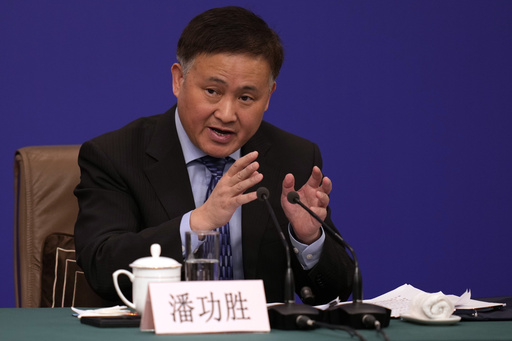BEIJING (AP) — China has plenty of room to maneuver to attain its annual target for robust economic growth of about 5% after a strong start for the year, top economic officials said Wednesday, though they acknowledged it’s a challenge.
China’s exports rose about 10% in the first two months of the year from a year earlier, while medium- and long-term loans from banks jumped more than 30%, said China’s top planning official, Zheng Shanjie, who heads the National Development and Reform Commission.
Zheng said the priority will be on “supporting scientific and technological innovation, integrated development of urban and rural regions, food security and energy security, among other areas.”
“The potential construction demand in these areas is huge and the investment cycle is long. It’s hard to fully meet needs using existing funding channels and there’s an urgent need to increase support,” he said at a news conference on the sidelines of the National People’s Congress, China’s ceremonial legislature.
Premier Li Qiang announced the “around 5%” growth target for the year Tuesday at the opening of the congress, which runs for about a week and mostly just endorses policies set by top leaders of the ruling Communist Party.
China’s economy, the world’s second largest, grew at a 5.2% pace in 2023, but that was from a relatively low pace since it expanded only 3% the year before, one of the lowest rates since the 1970s. Growth of around 5% would be cause for rejoicing in the U.S. and other major economies, but it’s moderate for a developing economy with a huge population like China’s.
Pan Gongsheng, the head of China’s central bank, and the other senior economic planners speaking on the sidelines of the congress said Beijing has more policy tools it can turn to, such as reducing the reserve ratio requirement, or the amount of funds banks must keep in reserves.
They emphasized Beijing’s determination to put 1 trillion yuan (about $140 billion) in special, ultra long-term bonds to productive use to upgrade industries and advance technologies in key areas such as clean energy.
The market for modernizing factory equipment amounts to about 5 trillion yuan (nearly $700 billion), Zheng said. That compares with the $649 billion the administration of U.S. President Joe Biden says private companies have committed to investing in such areas as clean energy, electric vehicles and semiconductors and electronics.
Despite robust growth in China’s exports in the first two months of the year, Commerce Minister Wang Wentao said global demand may remain muted given the recent trend toward protectionist measures.
Trade in goods and services rose a mere 0.2% in 2023, according to the World Trade Organization, and will increase this year but not to levels seen before the pandemic.
China’s own exports fell last year, adding to drags on the economy from weak consumer demand and a downturn in the property market, a major contributor to demand for construction, appliances and many other industries.
China plans to do more to promote exports of higher-value products and to support smaller and mid-sized companies in tapping world markets, he said.
“We are confident about consolidating the fundamentals of foreign trade and foreign investment,” Wang said.
To help spur more consumer spending, an increasingly important driver for growth as China becomes wealthier, the government plans to use tax policies and other incentives to encourage families to scrap their older vehicles, replace aging appliances and redecorate their apartments, the officials said.
In other comments, the chairman of China’s Securities Regulatory Commission, Wu Qing, acknowledged intervening in the financial markets at times when authorities deemed it necessary.
China’s stock markets languished from late last year, though they have recovered somewhat in recent weeks following a crackdown on price manipulation and insider trading among other confidence-boosting measures.
Hong Kong’s Hang Seng index is still 20% below where it stood a year ago, while the Shanghai Composite index has lost 8.5% at a time when many other world markets are breaching record highs.
“Normally there should be no intervention in the markets, but at times when they sharply deviate from fundamentals, show irrational and severe volatility, an extreme lack of liquidity, market panics or a severe lack of confidence, we should act decisively to correct market failures,” Wu said.
___
Research assistants Yu Bing and Chen Wanqing contributed to this report.



